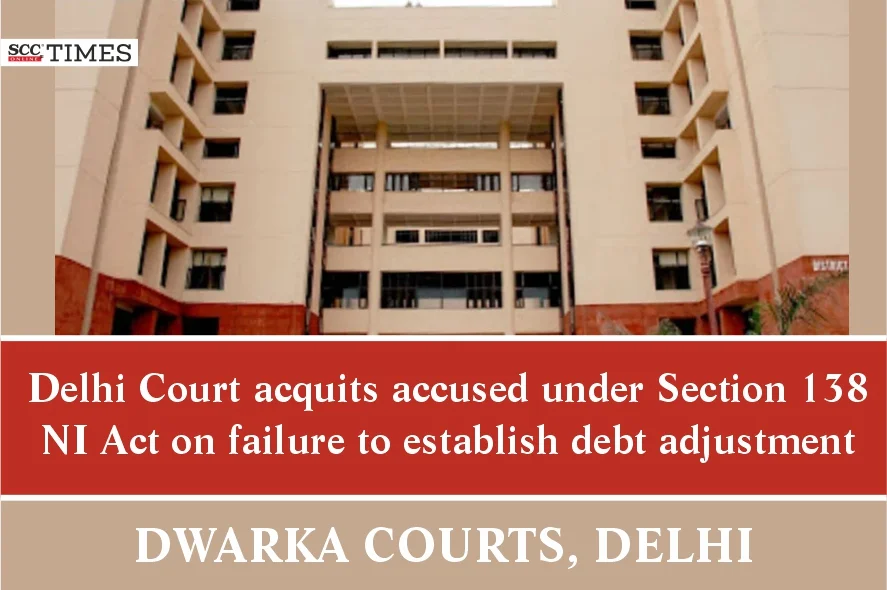Dwarka Courts, Delhi: A complaint was filed by the complainant against the accused under Section 138 of the NI Act challenging the dishonour of cheque due to insufficient funds in the accused’s account. Apoorv Bhardwaj, J., held that the accused is not guilty of offence under Section 138 of Negotiable Instruments Act, 1881 and accordingly acquitted him under Section 138 of Negotiable Instruments Act, 1881.
The case revolved around a dispute concerning a cheque issued by the accused, Ghanshyam Sharma, to the complainant, Ashok Tayal. The complainant alleged that the accused issued the cheque in discharge of a debt or liability but subsequently failed to honor it upon presentation to the bank. Consequently, the complainant initiated legal proceedings under Section 138 of the Negotiable Instruments Act, 1881 (NI Act) against the accused. Subsequently, the complainant issued a legal notice to the accused demanding payment of the cheque amount. When the accused failed to make the payment within the stipulated period, the complainant filed a case against him under Section 138 of the NI Act. The complainant contended that the accused’s failure to honor the cheque constituted an offense under Section 138 of the NI Act.
Counsel for the accused presented a defense challenging the existence of a valid debt or liability. He claimed that the amount represented on the cheque was not a loan but rather an adjustment of hire charges for trucks provided by him to Shri Shyam Transport Co., which was allegedly run by the complainant. The counsel asserted that the complainant was the proprietor of Shri Shyam Transport Co. and owed him a substantial sum for the rental of trucks.
The court conducted a thorough analysis of the evidence presented by both parties. It meticulously examined witness testimonies, documentary evidence, and legal principles governing negotiable instruments. The court scrutinized the validity of the debt claimed by the complainant and the alleged agreement between the parties regarding the adjustment of hire charges. The court observed inconsistencies in the complainant’s testimony regarding his association with Shri Shyam Transport Co. It found credible evidence supporting the accused’s claim that the complainant was indeed the proprietor of the company and owed him a significant sum for truck rentals.
Despite the complainant’s claim that the cheque was issued to discharge a debt, the accused successfully argued that the loan amount was offset by the hire charges for trucks provided to the complainant’s transport company. This assertion was supported by substantial evidence, including payment vouchers and witness testimony, undermining the complainant’s claim that the cheque was issued solely for debt repayment. The Court noted the absence of a written agreement between the parties regarding the adjustment of hire charges against the loan amount. While the complainant denied any such agreement, the accused provided compelling evidence, including invoices and contractual agreements, indicating that the hire charges were indeed intended to offset the debt. Despite the lack of a written agreement, the Court found the accused’s evidence convincing and concluded that the complainant failed to establish the existence of a legally recoverable debt.
The Court remarked that “The complainant has woefully failed to account for the amount of Rs 6,11,071/- which was due on him towards the accused. Therefore, it cannot be said that the amount represented on the cheque in question was a legally recoverable debt. In simpler terms, the accused claimed that the loan was offset by the rental charges for his trucks provided to Shri Shyam Transport Co. The complainant, however, denied any association with Shri Shyam Transport Co. This denial was proven false, and it was established that Shri Ram Transport Co., and consequently the complainant, owed the accused approximately Rs 6 lakh. When this amount was offset against the alleged loan, the sum represented on the cheque far exceeded the legal liability of the accused, effectively countering the presumption against him.”
Thus, the court held that the accused successfully rebutted the presumption against him and found that the amount represented on the cheque was not a legally recoverable debt owed by the accused to the complainant. Consequently, the court acquitted the accused of the offense under Section 138 of the NI Act.
[Ashok Tayal v. Ghanshyam Sharma, 2024 SCC OnLine Dis Crt (Del) 5, decided on 04-03-2024]
Advocates who appeared in this case :
Mr Udham Singh Yadav for the complainant
Mr Sahil Mongia, Sh. Rahul Yadav and Sh. Sahil Rao, for the accused







